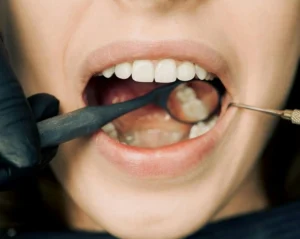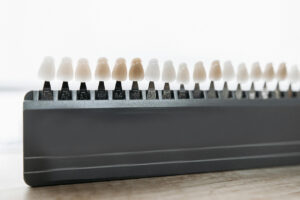For many, the thought of sitting in a dental chair can evoke feelings of unease and fear. If you find yourself feeling this way, you’re not alone. Navigating Dental Anxiety is a common challenge faced by individuals of all ages, but especially among adults seeking significant dental transformations. Whether it’s the fear of pain, the sound of drills, or the smell of antiseptics, dental anxiety can be a significant barrier to maintaining oral health.
Understanding and addressing this anxiety is crucial, not just for your oral health, but for your overall well-being. Dental anxiety often leads to brushing aside dental appointments, which can result in serious oral health issues over time. According to the American Dental Association, regular visits to the dentist are essential for preventing gum disease, tooth decay, and other dental problems. Yet, anxiety keeps many from these necessary appointments.
At Aleriom, we recognize the importance of overcoming these fears to achieve the smile you’ve always desired. We offer a range of affordable dental solutions, including the renowned All-on-4 procedure, performed by top dentists in Colombia. Our services are designed to provide not just dental care, but a complete experience that eases anxiety—from arranging safe transportation to providing 24/7 travel assistance, ensuring a seamless journey to a healthier smile.
This blog post will guide you through effective strategies for navigating dental anxiety. From relaxation techniques and open communication with your dentist to exploring sedation options, we aim to equip you with the tools needed to make your next dental visit a calm and positive experience. Ready to face your fears and transform your smile? Let’s dive in.
Understanding Dental Anxiety and Its Impact
Dental anxiety is a prevalent issue, affecting up to 50% of the population to some degree and being more prevalent in women according to studies published in the Journal of Dentistry (2021). It’s more than just a fear of the dentist; it can have profound effects on an individual’s oral health and overall well-being. This anxiety often leads to the avoidance of dental care, resulting in serious oral health problems over time. Recognizing the root causes and symptoms of dental anxiety is essential for addressing this issue effectively.
Many individuals experience dental anxiety due to a variety of factors. Common causes include fear of pain, previous traumatic dental experiences, and a general fear of loss of control during dental procedures. Understanding these triggers can help in developing strategies to manage and overcome anxiety.
Common Symptoms of Dental Anxiety
Dental anxiety manifests in several ways, and recognizing these symptoms is the first step towards managing them. Some of the most common symptoms include:
- Increased heart rate and sweating
- Feelings of panic or dread before appointments
- Difficulty sleeping the night before a dental visit
- Physical symptoms such as shaking or nausea
These symptoms can vary in intensity from mild unease to severe panic attacks, making it crucial for individuals to identify their specific triggers and symptoms.
Causes of Dental Anxiety
Understanding the causes of dental anxiety can help in developing effective coping strategies. Here are some common causes:
- Fear of Pain: Many fear the potential pain associated with dental procedures, often due to past experiences.
- Loss of Control: Sitting in the dentist’s chair can make individuals feel vulnerable and out of control.
- Previous Traumatic Experiences: Negative experiences in the past can lead to heightened anxiety in future visits.
- Fear of Needles: The fear of injections is a significant cause of anxiety for many patients.
Addressing these causes requires a tailored approach, often involving open communication with dental professionals and exploring various relaxation techniques.
The Impact of Dental Anxiety on Oral Health
The impact of dental anxiety extends beyond psychological discomfort. It often leads to the avoidance of necessary dental care, resulting in deteriorating oral health. Regular dental visits are crucial for maintaining healthy teeth and gums, as they allow for early detection and treatment of potential issues such as cavities and gum disease.
Without regular check-ups, individuals with dental anxiety may experience more severe dental problems, including tooth decay, gum disease, and even tooth loss. This not only affects oral health but can also have implications for overall health, as poor oral hygiene is linked to conditions such as heart disease and diabetes.
By understanding and addressing dental anxiety, individuals can take proactive steps towards maintaining their oral health and overall well-being. For more information on managing dental anxiety, explore our comprehensive guides on Aleriom’s website.
Effective Strategies to Overcome Dental Anxiety
Experiencing dental anxiety is more common than you might think, but the good news is that there are numerous strategies available to help you manage and overcome it. Whether it’s the fear of pain, the sound of dental instruments, or the anticipation of a procedure, understanding and implementing effective techniques can significantly reduce anxiety levels. Let’s explore some actionable strategies that can transform your dental visits into calm, stress-free experiences.
By incorporating relaxation exercises, maintaining open communication with your dentist, and exploring sedation options, you can take proactive steps towards overcoming dental anxiety. These methods not only help ease the mind but also ensure that you receive the dental care necessary for maintaining optimal oral health.
Practice Relaxation Techniques
Relaxation techniques are a cornerstone in managing dental anxiety. Simple methods such as deep breathing exercises can be incredibly effective. Before your appointment, take a few moments to close your eyes, inhale deeply through your nose, hold for a few seconds, and exhale slowly through your mouth. Repeat this process several times to calm your nerves.
Additionally, progressive muscle relaxation, where you tense and then slowly release each muscle group, can help reduce physical tension. Visualization, where you imagine yourself in a peaceful setting, can also be beneficial. These techniques can be practiced both at home and in the dental chair to help you stay relaxed throughout your visit.
Communicate Openly with Your Dentist
Open communication with your dentist is crucial in addressing dental anxiety. Before your appointment, discuss your fears and concerns with your dentist. A supportive dentist will listen and work with you to create a comfortable environment. They may explain each step of the procedure, allowing you to know what to expect and reducing the fear of the unknown.
Consider asking your dentist about using a ‘stop signal’—a pre-agreed gesture to pause the procedure if you feel overwhelmed. This can give you a sense of control and help alleviate anxiety during treatment.
Interested in preparing properly for your dental procedure?
Check out our blog: Essential Questions To Ask Your Dentist Before a Dental Procedure
Explore Sedation Options
For those with moderate to severe dental anxiety, sedation options can provide significant relief. Conscious sedation, such as nitrous oxide (laughing gas), helps relax patients while keeping them awake and responsive. Oral sedatives taken before the appointment can also help calm nerves.
In more severe cases, discussing the possibility of general anesthesia with your dentist might be appropriate. This would involve being fully asleep during the procedure, ensuring a stress-free experience. Always consult with your dental professional to understand the risks and benefits of sedation options available to you.
By implementing these strategies, you can effectively manage dental anxiety and ensure that your oral health is not compromised. Remember, you are not alone in this journey, and with the right approach, a stress-free dental experience is entirely attainable. For more insights and support, explore additional resources on Aleriom’s website.
Long-Term Benefits of Overcoming Dental Anxiety
Overcoming dental anxiety can have profound effects on your life, extending far beyond the dental chair. When you conquer this common fear, you not only improve your oral health but also enhance your overall quality of life. Regular dental visits become less daunting, allowing for early detection of dental issues, better oral hygiene, and increased confidence in your smile.
Imagine a life where dental appointments are no longer a source of stress. By addressing dental anxiety, you open the door to a healthier, more confident you. Consistent dental care ensures that potential problems are caught early, preventing more serious issues down the road. This proactive approach to oral health can save you from costly and extensive treatments in the future.
Improved Oral Health
Regular dental check-ups are crucial for maintaining healthy teeth and gums. Overcoming dental anxiety allows you to attend these appointments without fear, ensuring that your oral health is consistently monitored. This leads to the early detection of issues such as cavities and gum disease, which can be treated more effectively when caught early.
Moreover, with reduced anxiety, you are more likely to adhere to recommended oral hygiene practices, such as brushing and flossing regularly. This commitment to oral care not only preserves your smile but also contributes to your overall health, as poor oral hygiene has been linked to conditions like heart disease and diabetes.
Enhanced Confidence and Quality of Life
Overcoming dental anxiety can significantly boost your self-esteem and confidence. A healthy, bright smile can enhance your social interactions and professional opportunities. When you are no longer held back by fear, you can fully embrace life’s moments, smiling freely and engaging with others without hesitation.
Financial Savings
Addressing dental anxiety can also lead to financial benefits. By maintaining regular dental visits, you avoid the need for costly emergency treatments that often arise from neglected oral health. Preventive care is typically more affordable than restorative procedures, meaning that overcoming anxiety can save you money in the long run.
Furthermore, many individuals who overcome dental anxiety choose to invest in cosmetic procedures, such as veneers or smile makeovers. These enhancements not only improve aesthetics but also contribute to a more positive self-image, further enriching your quality of life.
For more insights on overcoming dental anxiety and exploring transformative dental solutions, visit Aleriom’s website. Embrace the journey to a healthier, more confident smile today.
Embrace a Stress-Free Dental Experience
Conquering dental anxiety is a transformative step towards achieving optimal oral health and enhancing your quality of life. Throughout this blog post, we delved into the core aspects of navigating dental anxiety, identifying its causes, symptoms, and the profound impact it can have on your well-being. By implementing the strategies discussed, you can transform your dental visits into positive experiences, ensuring that anxiety no longer stands in the way of maintaining a healthy smile.
To recap, some of the most effective strategies include practicing relaxation techniques such as deep breathing and progressive muscle relaxation, openly communicating with your dentist about your fears, and considering sedation options if necessary. These approaches help create a sense of control and calmness during dental appointments, making them less daunting and more manageable. Remember, the journey to overcoming dental anxiety begins with small steps, and each positive experience builds confidence, paving the way for regular dental care and improved oral health.
- Relaxation Techniques: Practice deep breathing and visualization to calm your mind before and during appointments.
- Open Communication: Discuss your concerns with your dentist and establish a ‘stop signal’ for added control.
- Sedation Options: Explore sedation methods like nitrous oxide or oral sedatives for a more relaxed experience.
As you embrace these strategies, consider taking the first step towards a healthier smile by scheduling a dental consultation. Overcoming dental anxiety not only benefits your oral health but also enhances your overall confidence and quality of life.
“The journey of a thousand miles begins with a single step.” Let this quote inspire you to take that first step towards a stress-free dental experience, transforming anxiety into assurance and a brighter, healthier smile.








